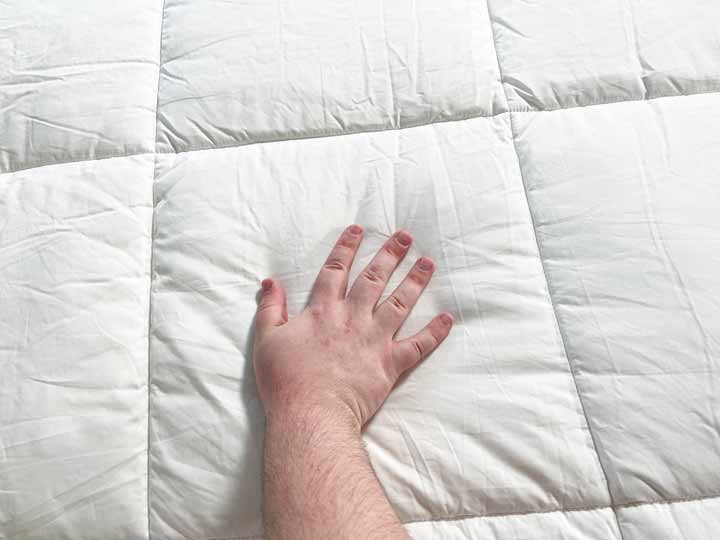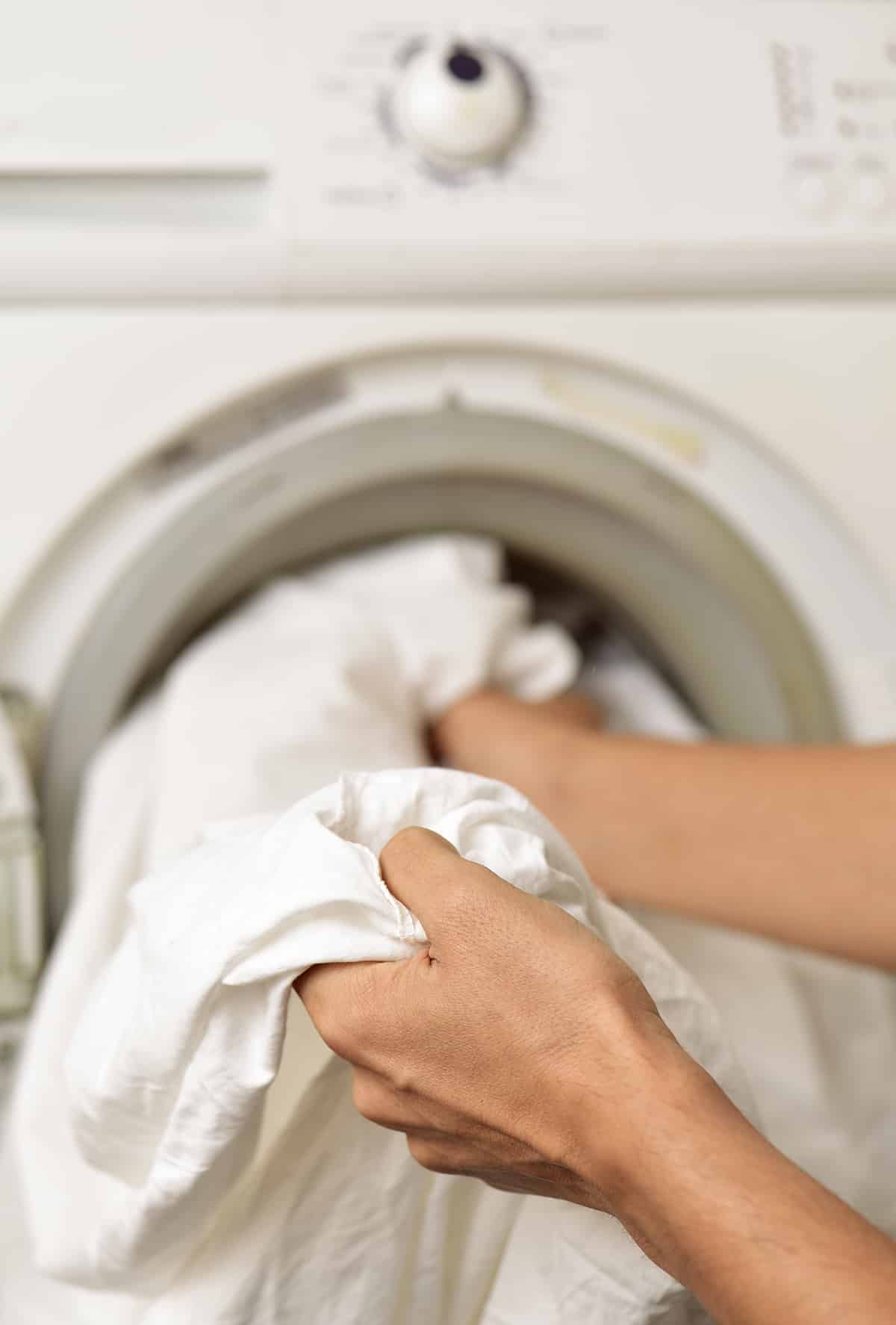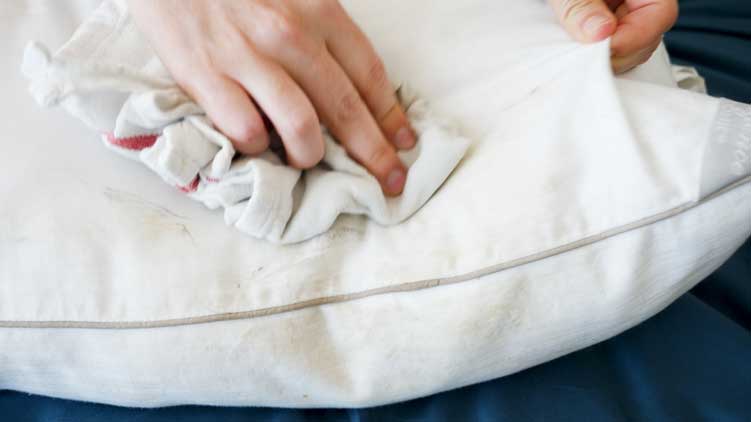Is your comforter feeling not-so-fresh? It’s true that your comforter doesn’t need to be washed as frequently as your sheets. However, your bedding should get a regular spin through your washing machine to remove dirt, oils, dust, bacteria, and allergens. So how often should you wash your comforter? According to Martha Stewart’s Homekeeping Handbook, your comforter should be cleaned about once per season.
How to Determine When to Wash Your Comforter
Washing your favorite comforter once every three months is a good general rule of thumb. However, your cleaning frequency may vary depending on several factors, including:
Illness
Viruses and bacteria can linger on soft surfaces, such as bedding. The Centers for Disease Control (CDC) says, “Cleaning alone removes most harmful viruses or bacteria from surfaces.” So be sure to wash all bedding, including your comforter, if you or your bed partner has been ill. Wash your comforter, sheets, and other bedding as soon as the illness is gone.
When you’re washing your comforter to help prevent the spread of illness, wash and dry using the warmest temperatures recommended on the care label. Make note of the recommended water temperature for your laundry detergent; some detergents are more effective at specific temperatures. Don’t worry about scorching germs with the highest temperature settings possible. According to the CDC, hot water washing isn’t necessary, even if you’re removing extra resilient bacteria such as MRSA.
Consider more frequently washing your comforter if you have sensitive skin or allergies.

Spills
Sometimes a bowl of ice cream and a binge of your favorite streaming series is just what you need after a hard week. If your weekend dive into your favorite chocolate ice cream leaves a stain on your comforter, you’ll want to clean it up immediately.
Spread the comforter out on your bed or a large table to treat the stain before you toss it into the wash. Use an enzyme-based stain treatment or heavy-duty detergent. (Out of stain removers? A few drops of Dawn dish soap can be used as a laundry stain remover.) If you’re using a new spot remover, you should spot-test it in an inconspicuous area first.
Anytime you notice a new spot or stain may be a good enough reason to wash your comforter.
Animals
If you let your dog in the bed, you’re not alone. According to an American Academy of Sleep Medicine survey, nearly half (46%) of Americans sleep with their pets. That figure is even higher for singletons; almost 8 out of 10 single people let their pets share their beds.
Unfortunately, when you welcome Fido into your bed, you’re inviting in extra dirt, bacteria, and possibly even creepy critters such as intestinal parasites, fleas, and ticks.
If you regularly sleep with a pet, you’ll want to wash your bedding more frequently than someone who doesn’t. Consider a 1x monthly washing routine for your comforters and shorten the time between washing sheets and blankets. And remember to wash that doggy regularly, too.
Material
Another factor to consider when it comes to when (and how) to wash your comforter is the materials that make up your bedding.
Fabric can consist of either natural or synthetic materials or a blend of both. Some fabrics can be laundered at home in a washing machine, while others require a professional dry clean.
- Bedding made from natural materials, such as cotton or linen, will likely withstand a spin through the washing machine.
- Natural fibers such as silk and wool are often designated as dry clean only, but may be washable with cold water and mild detergent.
- Synthetic materials are usually plastic based and could be damaged by high heat or aggressive wash cycles.
Be sure to read the care label to understand the materials used in your comforter and the manufacturer’s recommendations for washing, bleaching, and drying.
Sweat
Waking up covered in sweat isn’t the most pleasant experience, whether the cause is a hot summer evening or night sweats brought on by illness, medications, or changing hormones.
Night sweats may not require more frequent washing if you sleep in between sheets and your body doesn’t come into contact with your comforter at night. You may also stave off more washing by using a cooling comforter to keep night sweats at bay.
However, if you skip the top sheet and your comforter is in direct contact with your skin, increase how often you toss it in the wash. Night sweats could be a reason to wash your bedding more often. Consider a weekly wash for sheets, blankets, and duvet covers and a monthly wash of pillows and comforters.

Duvet cover
If your comforter can’t be machine-washed, consider topping it with a removable cover in a more durable material that can be washed at home.
Think of a duvet cover like your sheets, and send it through the wash every week or two. Of course, how often to wash a duvet cover will vary depending on how often the cover is used and by how many people (or pets) are sleeping on it.
Wash your duvet cover as soon as possible if you notice an unpleasant odor or visible stains.
How to Wash a Comforter
Once you’ve verified that your bedding is machine washable, here’s how to wash a comforter:
- Spot clean any visible stains
- Wash your comforter alone (not with other clothing or items)
- Follow the manufacturer’s instructions for temperature and detergent
- Choose the right settings on your washing machine for the size and material of the load
- Dry according to the care label
How Often Should You Wash Other Bedding?
Your comforter doesn’t need washing as frequently as the bedding that comes into contact with your body every night, such as bed sheets, blankets, and pillows. Your bedding is in constant contact with oils from your body and hair, dirt, bacteria, skin cells, sweat, and saliva, so it makes sense to wash these items more often.
Bed Sheets
When you think about all the not-so-pleasant things that can get transferred onto your sheets as you spend 8 hours a day lying in your bed, it might be tempting to wash them after every use. But the rule of thumb for how often you should wash your sheets is actually once every week or two.
Like your comforter, you can stretch out washings if the sheets are used infrequently or only by one person. But you may want to wash sheets more often if you share your bed with a partner or pet, or if you have allergies, an illness, or night sweats.
Follow the manufacturer’s instructions for how to wash your sheets, which may include specifics for water temperature, type of detergent, or directions for drying.

Pillowcases
Pillowcases should be washed just as frequently as your sheets. You may even consider washing your pillowcases more frequently. Your pillowcase isn’t just supporting your head and hair as you sleep; it’s also absorbing:
- hair oils
- saliva
- skin cells
- sweat
- dirt
- bacteria
- chemicals from cosmetics, skincare, and hair care
Keeping your pillowcases clean can help prevent acne and support healthy hygiene. Wash pillowcases once weekly, or more often if you tend to sleep with a faceful of makeup or in hair that’s not frequently washed.
Pillows
How often you wash your pillows will vary based on the materials that make up your pillow and the manufacturer’s instructions. A good rule of thumb is to wash pillows every three to six months.
Not quite sure how to clean your pillow? The good news is that most pillows can be tossed directly into a washing machine. However, some specialty pillows will require extra care or only spot cleaning. Let the label be your guide and be sure to follow cleaning instructions carefully.

Blankets
Most blankets can be washed seasonally (every three months). Your blanket usage is the best indicator of how often to wash it.
That blanket on your guest bed that gets used occasionally can be treated like a comforter: give it a seasonal wash.
The blanket from your kid’s bed that gets used nightly and dragged around the house, onto the couch, and carried into the car? Treat that blanket like a sweaty set of sheets and get it into the washing machine for a weekly clean.
Mattress Covers
A mattress pad or mattress cover goes under your sheets and works to protect against dirt, stains, and liquids that could be hard to clean out of a mattress. Because it doesn’t directly touch your skin, your mattress cover won’t need to be washed as frequently as your sheets.
Generally, your mattress cover can get a seasonal wash, just like your comforter and pillows. But if your mattress cover is supporting someone with night sweats, an illness, or helping to ease your littlest through potty-training, then more frequent washing (monthly or even weekly) could be appropriate.
Mattresses
No matter how many layers of bedding we pile on top of a mattress, stains still happen. Urine, sweat, and blood stains are incredibly common on mattresses. After all, we spend nearly 1/3 of our lives in our beds, so it’s not surprising that an occasional accident, spill, or mishap could occur.
Just because a mattress stain happens doesn’t mean you have to see a visible reminder of it every time you swap your sheets. Here’s how to clean your mattress and remove those pesky mattress stains:
- Check with the manufacturer: look at labels or visit their website for cleaning tips
- Treat stains as soon as you notice them
- Let stain treatments dry completely before redressing your bed
FAQs
Are you supposed to wash your comforter?
All bedding should be washed regularly, including comforters. A good rule of thumb is to wash comforters once per season (every three months) per the manufacturer’s instructions on the label.
Should you wash your comforter before using it for the first time?
Washing new bedding before you use it is always a good idea, particularly if you or someone in your home has allergies or chemical sensitivities. Brand new bedding may be covered in dust, chemicals, dyes, and irritants that came from the factory during the manufacturing process.
Can comforters go in the dryer?
If your comforter label tells you it can be dried, go ahead and put your comforter in the dryer. Most comforters will require a low-heat setting. Add wool dryer balls to help fluff it and dry the comforter per the instructions on the label.
Are comforters machine washable?
The short answer is: it depends. Some comforters are specifically made to be machine washable, while others may require dry cleaning. Look for natural materials such as cotton if you want a machine washable comforter, and always check your label to verify if it can be washed in a machine or not.
When in doubt: always let your label be your guide.

